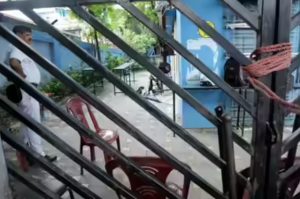CU Probe Panel Grills Law College — Members of the governing body of a prominent Kolkata-based law college are under investigation by a Calcutta University (CU) fact-finding committee following serious questions about procedural lapses, misuse of authority, and inaction on critical issues—including staffing, student conduct, and administrative overreach.
The panel, constituted in the aftermath of a disturbing incident on campus and wider concerns of irregularities, is scrutinizing not just decisions made, but the failure to oppose or document dissent in cases that demanded transparency and accountability.

Background of the Investigation
The CU panel was set up shortly after reports of a student-related crime and subsequent allegations of irregular admissions, extended governing body tenure, and procedural negligence surfaced at the institution.
At the core of the inquiry is the concern that governing body members either approved or remained silent during several contentious decisions, including the reappointment of individuals previously found guilty of misconduct, and the involvement of accused individuals in student leadership.
Key Questions Raised by the Probe Panel
1. Why no written dissent?
CU has demanded to know why members who allegedly disagreed with major decisions failed to formally record their objections. The panel insists that verbal opposition carries no procedural weight, and silence is being interpreted as complicity.
2. Expelled student reinstated as staff
One member was specifically questioned for allowing an expelled student, previously removed for disciplinary reasons, to return as casual staff—without registering formal opposition in meeting records.
3. Empowering an accused student leader
The panel has also raised concern over how Monojit Mishra, the prime accused in a high-profile case, was allowed to play a central role in campus activities with no recorded resistance from the governing body.
4. Overstayed tenure of governing body
The governing body, formed in 2017 with a four-year mandate, was never properly reconstituted after its term expired. Instead, it continued functioning with questionable legitimacy.
5. Irregularities in admissions
Complaints submitted to CU suggest that some students gained entry into the college despite not meeting eligibility criteria. There are also reports of “paid” seats and deliberate bypassing of university norms.
What Has Been Done So Far?
- The CU panel has already examined several members, including university-nominated representatives and the vice-principal of the college.
- On Monday evening, one CU nominee was questioned for failing to challenge the appointment of previously expelled students. When asked why dissent wasn’t filed, the nominee reportedly admitted to raising objections orally but did not follow through formally.
- Vice-principal Nayna Chatterji was summoned earlier and asked over 35 written and oral questions. She has submitted responses which are under review.
The college has also submitted documentation related to governing body meetings, admissions, student conduct, and staffing to the university for cross-verification.
Accountability and Oversight in Question
The lack of dissent, along with the continued tenure of an expired governing body, points to serious governance issues within the institution. CU is investigating whether university regulations were knowingly bypassed and whether collusion or political pressure played a role in these decisions.
This has implications for not just one law college but for the governance of all CU-affiliated colleges that function under similar regulatory frameworks.
CU Probe Panel Grills Law College: CU’s Broader Mandate
CU Vice-Chancellor Prof. Santa Datta De has been clear: written dissent and adherence to tenure limits are non-negotiable. She emphasized that CU’s goal is not just to address isolated incidents but to ensure systemic reforms in affiliated institutions. The university has issued fresh instructions to its nominees to maintain thorough documentation of proceedings and raise alerts on any deviations from statutory norms.
CU is now preparing for potential reconstitution of the governing body and considering new nominations that reflect integrity and independence from internal politics.
What Happens Next?
- CU’s final report will recommend disciplinary or legal action against individuals found negligent or complicit.
- Admission records from the last few years will be matched with university databases to identify discrepancies or fraudulent entries.
- The university’s legal cell may initiate proceedings if criminal negligence or procedural fraud is established.
- A review of all governing bodies under CU’s jurisdiction may be initiated to prevent future lapses.
Impact on Students and Faculty
This investigation has delayed some academic processes, including first-semester exams, and disrupted normal functioning on campus. Students have expressed concern over reputational damage and uncertainty around institutional leadership. Faculty members have largely supported the investigation, seeing it as an opportunity for long-overdue reform and transparency.
Conclusion
The Calcutta University probe into the law college’s governing body is a clear assertion of academic and administrative accountability. It underscores the importance of governance ethics, transparent documentation, and the legal responsibilities of decision-makers within public educational institutions.
This case is likely to set a precedent for how universities in West Bengal monitor and enforce institutional compliance in colleges that operate under their academic and administrative purview.
Official External Links for Further Information
Also read: Home | Channel 6 Network – Latest News, Breaking Updates: Politics, Business, Tech & More

